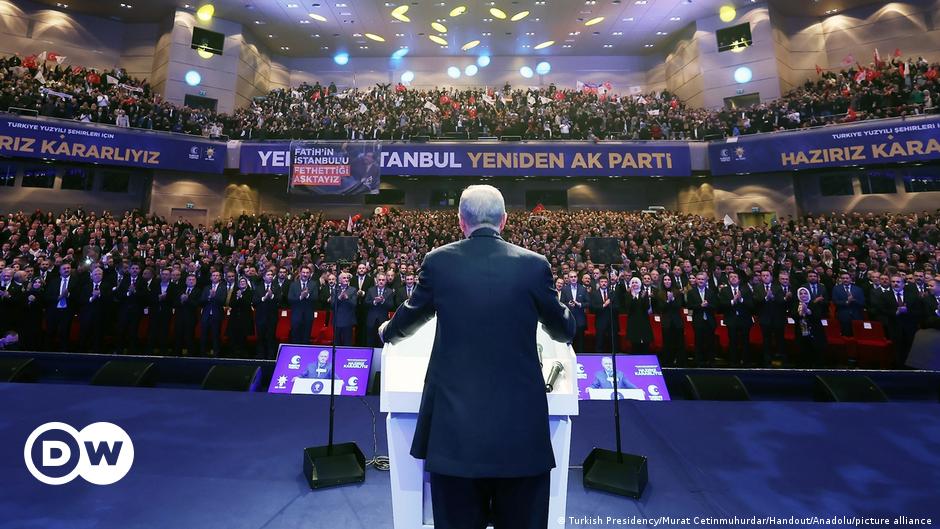Turkish President Recep Tayyip Erdogan wants to boost voter confidence. A few days ago, announcing AKP candidates and kicking off the local election campaign, he proclaimed: “We will defeat the opposition in all their strongholds!”
With the elections taking place on March 31, Erdogan is especially keen to win back Turkey’s economically powerful cities of Istanbul, Ankara, Izmir and Antalya from the opposition. But he doesn’t seem confident of victory. Erdogan knows all too well that voters in big cities are unpredictable, which is why these seats are so hotly contested.
Whoever controls the big cities holds a lot of power — they together account for nearly half of Turkey’s economic output — so the AKP is determined to take them back at all costs, and is doing whatever it takes to do so, including imposing ever-tighter restrictions and censoring the internet.
In December, 16 virtual private network (VPN) services were revealed to have been blocked in Turkey without a court order, based on a directive from Turkey’s Information and Communications Technology Authority, including popular services such as Proton, Surfshark, SuperVPN, and Psiphon. Some of the blocked VPNs are ones that DW uses and recommends to circumvent censorship in some parts of the world.
A VPN is a digital service that allows users to browse the internet in an encrypted and protected way. VPNs are particularly popular and widespread in authoritarian countries, where they are primarily used to access blocked websites and restricted social media.
712,000 web pages will be blocked in 2022
According to the Turkish Freedom of Expression Association, which has documented internet censorship in Turkey for years, more than 712,000 web pages were blocked in the country in 2022. Around 150,000 URL addresses, 9,000 Twitter (now X) accounts, 55,500 tweets, 16,585 YouTube videos, 12,000 Facebook pages, and 11,150 Instagram posts were also blocked, according to the association’s annual report. These measures were taken in response to Turkey’s 2007 Internet Law.
Turkey’s internet law has been amended 19 times since 2007, and in 2020 it added restrictions on social media. Image: OZAN KOSE/AFP/Getty Images
Digital technology expert Füsun Sarp Neville says the passing of this law marked the beginning of internet censorship in Turkey. “Until 2013, there was some blocking of YouTube and Eksi Sözlük (a popular information site where users can post content), but censorship wasn’t very strict,” he said. But since the Gezi protests of 2013 and the corruption scandals that same year, the laws have been significantly strengthened, Neville explained.
In May 2013, environmental activists began protesting against development of Istanbul’s popular Gezi Park. The protests, organized primarily online, quickly intensified. In December 2013, the biggest corruption scandal to date surrounding President Erdogan followed: recordings of numerous secret phone conversations were published on YouTube, exposing suspicious transfers of funds between government officials and shady businessmen. The Turkish government responded by further restricting internet laws.
“In the last 17 years, the government has amended the law 19 times,” Neville said. In 2020 it was amended to include social media. The so-called “disinformation law” followed in 2021.
Many experts say the disinformation law is a new tool to stifle freedom of speech and press. They say it aims to create an atmosphere of fear and silence any criticism under the pretext of protecting the public from disinformation. The law imposes severe penalties on those who mislead or spread “false information about the country’s internal and external security.” The vague language allows for broad interpretation. For example, a single post could be punishable by up to three years in prison, a provision often used by pro-government prosecutors and judges.
Blocking criticism of the ruling AKP
Füsun Sarp Nevir explains that internet laws are often used to block criticism of the ruling AKP party. Posts about corruption, failure and nepotism are quickly censored. “Last year, the prosecutor’s letter made it clear that blocking can also be done through bribery,” she says.
The government also does not want negative coverage ahead of important local elections: candidates running for the government’s electoral coalition should not be portrayed in a negative light.
Turkey ranks 165th in the Reporters Without Borders press freedom index. Only 15 countries are judged to be worse than Turkey. Photo: Maurizio Gambarini/DPA/Picture Alliance
Neville, a digital technology expert, says that by blocking 16 VPN services, the government is trying to exert maximum control over the internet. Is this strategy successful? Probably, he says. “If the government continues to perform well in elections despite its many failures and poor response to various crises, you have to consider that the strategy is working.”
Meanwhile, Neville points out that with internet laws and bans on services being constantly tightened in recent years, Turkish citizens are now good at circumventing them. If one VPN is blocked, they quickly switch to another. “A lot of people in Turkey are very used to VPNs compared to a lot of other countries,” she says. “It’s a cat-and-mouse game. These days, we even laugh about it.”
Technical restrictions are another form of censorship
Neville explains that the government is not only increasing censorship to silence criticism, but is also deliberately hindering the expansion of digital infrastructure.
She told DW that in 2006, 11 companies were awarded licenses to lay a modern fiber-optic network, paying huge sums at the time — between $100,000 and $200,000 depending on the region — but the government has repeatedly delayed the completion of the digital infrastructure, resulting in only a fraction of the progress originally planned.
“We saw the tragic results after the earthquake,” Neville points out.
On February 6, 2023, two major earthquakes struck southern Turkey, killing more than 50,000 people. After the earthquakes, communication networks partially collapsed, making it impossible to coordinate search and rescue operations and humanitarian aid.
This article was originally written in German.


